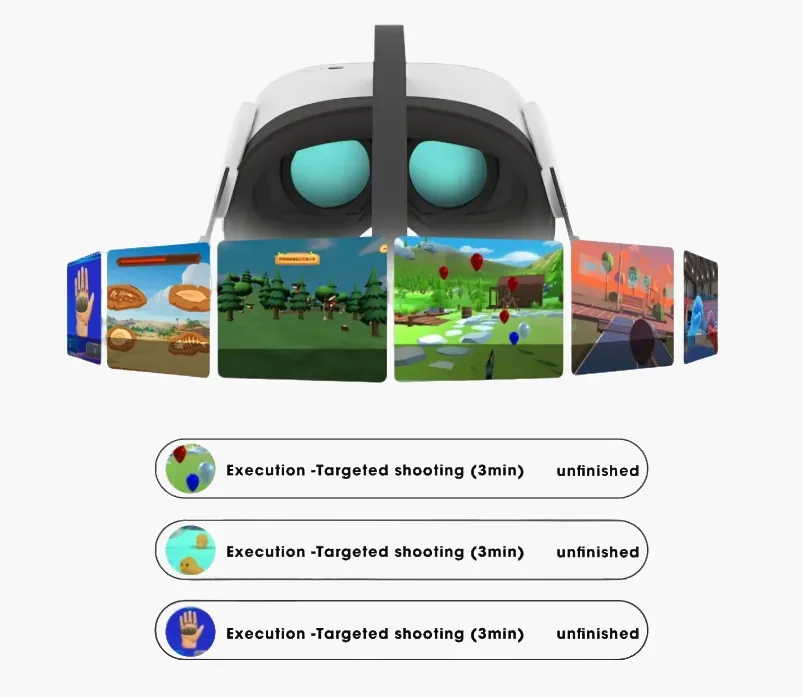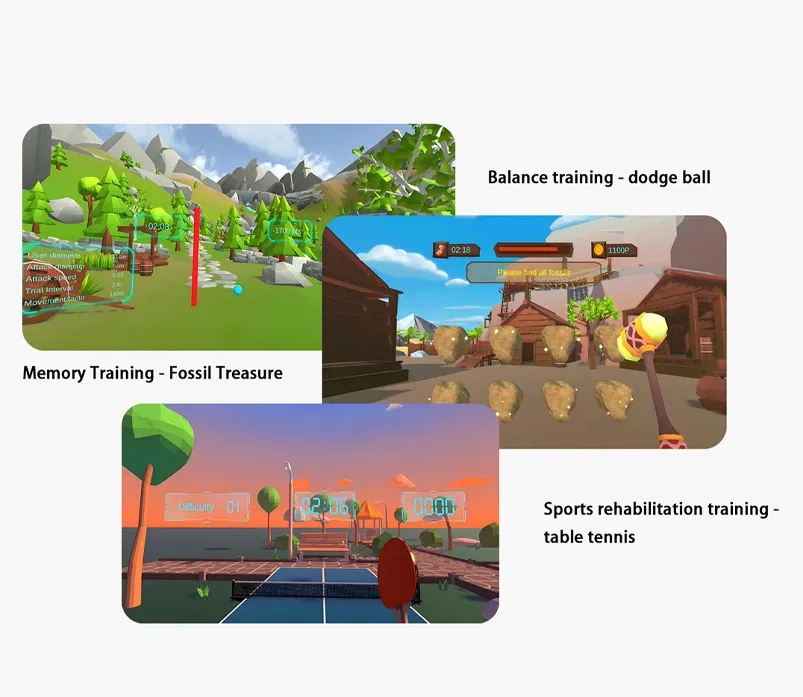
Advancing investigations proposes that computer-generated reality treatment can greatly elevate the welfare of people living with memory disorders. By relocating them to tranquil atmospheres, VR presents a exclusive option for mind energizing, affective stabilization, and group participation. Diverse investigations have revealed that VR therapy can reduce fretfulness, stress, and melancholy in dementia those diagnosed while also enhancing their memorization, awareness, and dialogue proficiency.
- VR grants users with dementia to reminisce fond remembrances through interactive emulations.
- What's more, it can grant a secure and nurturing space for socialization, promoting a awareness of link and togetherness.
- Investigators hold that VR therapy has the prospect to reshape dementia management by giving new and creative approaches to deal with the intricate barriers faced by subjects experiencing this ailment.
Digital Therapeutics for Cognitive Enhancement in Alzheimer's Disease
Emerging online solutions are proving useful in the area of brain function boosting for persons suffering from Alzheimer syndrome. These tools utilize technical resources to enhance brain activity and hypothetically lessen the development of the health issue. Immersive tasks, personalized recommendations, and psychological training are some samples of approaches being studied in this emerging sector. While experiments are underway, digital therapeutics furnish a potential avenue for boosting the states of those diagnosed with Alzheimer's disorder.Navigating Reality Through Virtual Landscapes: A Novel Approach to Alzheimer's Treatment
With respect to people experiencing cognitive Alzheimer's ailment, the ongoing weakening of mind function and psychological faculties can greatly affect their capability to connect with the external setting. This disabling syndrome often generates in remoteness, bewilderment, and a reduced self-concept. Up-to-date refinements in virtual reality technology offer a trailblazing avenue to tackle these challenges by developing immersive scenarios that can activate the brain and foster cognitive function.
Computer-generated surroundings developed specifically for Alzheimer's sufferers can transport them in nostalgic places, such as their youthful dwelling or a popular natural site, recalling positive memories and mitigating anxiety. Through interactive activities, these virtual universes can also challenge cognitive abilities like recollection, mindfulness, and problem-solving.
The likely improvements of virtual reality in Alzheimer's therapy are manifold. Early tests have disclosed encouraging results, with patients showing improvements in cognitive capacity, mood, and overall quality of life. As this platform proceeds, it holds the key to remodeling the way we approach Alzheimer's disease, affording a new pathway for help and advocacy.
Computer-Aided Reminiscence for Alzheimer's Victims
Reminiscence therapy is an acknowledged technique used to increase cognitive function and mental health in individuals with Alzheimer's disease. This traditional form of therapy involves encouraging patients to express past experiences, often through narratives. However, a pioneering approach is emerging: VR-mediated reminiscence therapy.
This immersive innovation utilizes virtual reality headsets to relocate patients in faithful environments that arouse memories from their past. By re-experiencing these replicated atmospheres, individuals with Alzheimer's can relate with their past in a valuable way.
VR-Based Approaches for Memory and Cognitive Enhancement in Dementia
Virtual reality (VR) is emerging as a hopeful instrument in the fight against dementia, offering state-of-the-art ways to invigorate memory and cognition. By producing immersive platforms, VR can help individuals with dementia reexperience memories, engage in meaningful activities, and develop cognitive aptitudes. Studies have confirmed that VR interventions can demonstrate substantial improvements in memory recall, attention, and dimensional awareness. Moreover, VR provides a protected and motivating space for individuals with dementia to demonstrate, reducing feelings of isolation and anxiety.
- Moreover, VR can be configured to individual needs and preferences, facilitating increased levels of communication.
- Considering the prospects of VR, progressive research is needed to fully understand its long-term effectiveness in dementia care.
Memory Revival and Social Renewal: VR's Role in Alzheimer's Community Engagement
Augmented virtual worlds is emerging as a state-of-the-art mechanism in the realm of Alzheimer's disease. By simulating captivating and communicative environments, VR has the capability to spark memories, cultivate social interaction, and enhance the overall quality of life for persons affected by Alzheimer's. One of the most influential aspects of VR is its ability to relocate users to nostalgic spots and moments from their past. Whether it's a jaunt inside a childhood home or a depiction of a beloved holiday, these virtual walkthroughs can conjure happy memories and improve cognitive function. Furthermore, VR can aid social cognitive function reheablation interaction by joining individuals with others who share similar traits. This can be particularly useful for people with Alzheimer's who may face difficulties with traditional social engagement. By maintaining a safe and absorbing virtual space, VR can reduce feelings of isolation and loneliness, which are common among clients living with Alzheimer's. Overall, VR holds immense capacity for overhauling the lives of patients with Alzheimer's by resurrecting memories, recovering connections, and augmenting their quality of life. As technology proceeds to improve, we can expect even more advanced applications of VR in the field of dementia care.Enhancing Cognitive Training: Utilizing VR for Alzheimer's Symptom Management
VR technology is rapidly emerging as a revolutionary tool in the realm of cognitive training, particularly for users affected by Alzheimer's disease. By immersing patients in interactive and engaging virtual environments, VR-based interventions can advance cognitive functions such as memory, attention, and problem-solving. These games frequently incorporate elements of storytelling, exploration, and social interaction, making the training process exceptionally satisfying. Studies have shown that VR-based cognitive training can lead to significant improvements in cognitive performance, likely delaying the progression of Alzheimer's symptoms. Moreover, VR provides a safe and controlled environment for patients to practice new skills and improve their confidence.
- Play-based techniques in VR training can make it deeply absorbing and pleasant for people with mental challenges.
- VR simulations can offer authentic scenarios that push and engage cognitive functions.
- Personalized VR experiences can cater to particular desires and modalities.
Harnessing Virtual Settings for Dementia Relief
Alluring replicated spaces offer a fresh and promising avenue for persons suffering dementia. These solutions can recreate familiar environments, allowing those affected by cognitive decline to recapture cherished memories and encourage a sense of well-being. By alleviating the issues of dementia, VR scenarios have the power to advance quality of life for both participants and their aides.
- Analyses indicate that VR uses can noticeably impact cognitive function, neural well-being, and even neuromuscular abilities in individuals with dementia.
- Moreover, VR enables a safe and supportive environment for participation, reducing the risk of stress.
- Moreover, VR can strengthen social relationships by allowing individuals with dementia to collaborate in simulated activities with others.
Virtual Reality for Prompt Alzheimer's Screening and Intervention
Alzheimer's disease emerges a multifaceted issue, often continuing unnoticed in its early stages. Nonetheless, virtual reality (VR) is developing as a cutting-edge tool for prompt recognition. Through immersive platforms, VR can measure cognitive function in ways that traditional methods cannot cope to. This power allows for quick response strategies, potentially pausing disease progression and enhancing the quality of life for subjects with Alzheimer's.
- VR platforms enable safe and monitored examination of memory, attention, and navigation abilities.
- Tailored VR programs enable patients to partake in mental activation tasks.
- Computer-generated spaces provide social conditions for Alzheimer's clients to bond and mingle.
Virtual Reality Solutions for Better Contact and Engagement in Dementia Care
{In the realm of dementia care, innovative technologies are emerging to advance the lives of people affected by dementia. Virtual reality (VR) is one such mechanism that holds immense promise for reducing isolation through VR-mediated social and communicative support. By creating immersive and engaging virtual environments, VR can stimulate cognitive function, reduce behavioral issues, and ultimately improve the overall well-being of dementia patients.
VR experiences designed for neurodegenerative disease management can range from reflection therapy sessions that take clients to known past settings, to interactive games that promote social interaction and cognitive exercise. Furthermore, VR has the aptitude to connect users experiencing dementia with caregivers, regardless of physical gaps, fostering a sense of inclusion.
- VR can help in reducing agitation and anxiety by providing a calming and enticing environment.
- Examinations have shown that VR interventions can lead to improvements in cognitive function, mood, and social interaction in persons living with cognitive impairment.
- As technology expands in advance, we can expect even more innovative and {effective|beneficial|helpful|powerful|impactful|successful|productive|efficient
